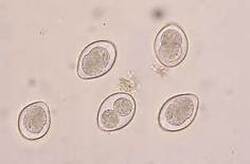Coccidia
 These are coccidia viewed under a microscope.
These are coccidia viewed under a microscope.
Coccidia are tiny single-celled parasites that live in the wall of your dog’s intestine. They are found more often in puppies, but they can also infect older dogs and cats.Dogs become infected by swallowing soil that contains the microscopic coccidia or other substances in the environment that may be contaminated with infected feces.
Symptoms:
Coccidia many not cause symptoms in a otherwise healthy adult dog, but coccidia can cause bloody diarrhea in puppies and immunocompromised adults. Severe infections can cause fatalities.
Diagnosis:
A fresh stool sample should be provided to your veterinarian for accurate diagnosis. These parasites are microscopic, so there is no way to tell that they are present just by looking with the naked eye. There are many parasites that can cause similar symptoms in pets, so an accurate diagnosis is important.
Treatment:
Upon diagnosis, your veterinarian will provide medication for your pet. Medication is usually a 10 to 14 day course of tablet or liquid anti-coccidia agent. Severely affected pets may need additional treatments such as fluids or anti-diarrheal agents.
Prevention:
It is helpful to remove all feces regularly from your dog's environment. All dogs should have a stool sample checked for these parasites (and others) at least twice a year. Coccidia are "species specific", meaning that dog coccidia doesn't infect cats and vice versa.
Symptoms:
Coccidia many not cause symptoms in a otherwise healthy adult dog, but coccidia can cause bloody diarrhea in puppies and immunocompromised adults. Severe infections can cause fatalities.
Diagnosis:
A fresh stool sample should be provided to your veterinarian for accurate diagnosis. These parasites are microscopic, so there is no way to tell that they are present just by looking with the naked eye. There are many parasites that can cause similar symptoms in pets, so an accurate diagnosis is important.
Treatment:
Upon diagnosis, your veterinarian will provide medication for your pet. Medication is usually a 10 to 14 day course of tablet or liquid anti-coccidia agent. Severely affected pets may need additional treatments such as fluids or anti-diarrheal agents.
Prevention:
It is helpful to remove all feces regularly from your dog's environment. All dogs should have a stool sample checked for these parasites (and others) at least twice a year. Coccidia are "species specific", meaning that dog coccidia doesn't infect cats and vice versa.
